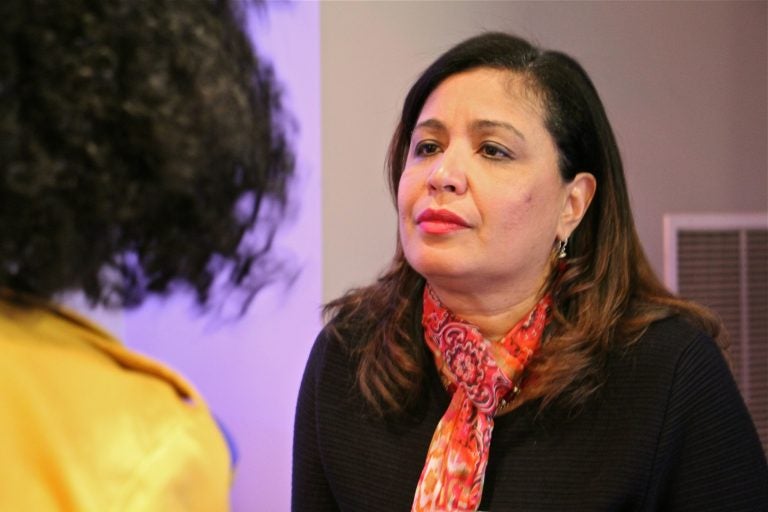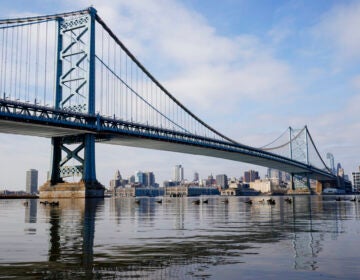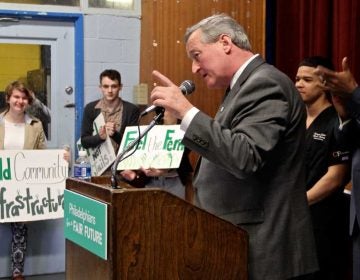Beverage industry spent big on Quiñones-Sánchez, but soda tax still seems secure
While beverage association spent $631,000 on soda tax opponent Quiñones-Sánchez, she won race by just 485 votes.

Philadelphia City Council candidate Maria Quiñones-Sánchez. (Emma Lee/WHYY)
Philadelphia Mayor Jim Kenney’s best funded opponent during his 2019 re-election bid wasn’t even running against him.
The American Beverage Association spent $631,390 in independent expenditures on Councilwoman Maria Quiñones-Sanchez’s hotly contested re-election bid, according to state campaign finance reports. That total is many times more than the combined war chests of the mayor’s now-defeated opponents.
Quiñones-Sanchez is the fiercest critic of Kenney’s signature accomplishment, the tax on sugar-sweetened beverages, and was targeted by his allies in the International Brotherhood of Electrical Workers Local 98, who spent heavily on her archrival, state Rep. Angel Cruz.
The soda industry’s massive spend, which financed phone banking, canvassing, and direct mail urging Quiñones-Sánchez’s re-election, may have helped give her a much-needed edge in the primary. The spending was not coordinated with her campaign, and went to Dewey Square Group and Bluefront Strategies, both Washington, D.C. consulting firms.
Quiñones-Sánchez eked out a win over Cruz by just 485 votes out of a total 11,658 ballots cast.
Reached via text message Friday afternoon, she expressed surprise at the amount the ABA spent: “Wow. I did not coordinate. I did not have a clue what they spent.”
The beverage association support of Quiñones-Sánchez was only one part of their political strategy. In April, the soda industry also spent more than $600,000 attacking Kenney and the tax on sweetened beverages. They did not spend in support of his opponents, who were considered longshots, although they did support a handful of at-large Council candidates and incumbents.
National media framed the race in terms of the soda tax’s fate. After the mayor’s resounding victory on Tuesday, where he claimed almost 67% of the vote in a three-way race, Kenney’s team felt justified in taking a double victory lap.
“I think the beverage industry decided to make it a referendum on the beverage tax by spending several hundred thousand dollars in ads against the mayor and against the tax itself,” said Jim Engler, Kenney’s chief of staff. “I think the people of Philadelphia spoke very clearly, as you see not only from the mayor’s overwhelming victory but from Councilwoman Helen Gym, who was the next strongest supporter of the tax.”
Gym, a champion of the tax and its programs, was the second-highest vote getter in the city on Tuesday’s election, securing only 24,782 fewer votes than the mayor himself.
Looking for perspective
But soda industry representatives were quick to complicate the narrative that the election says much of anything about the soda tax. Anna Adams-Sarthou with the Ax the Bev Tax Coalition argued that the industry concentrated its spending on the City Council races.
Adams-Sarthou said the hundreds of thousands of dollars spent on ads attacking Kenney were simply an attempt to highlight the legislation that Quiñones-Sanchez introduced that could lead to the repeal of the tax.
“Technically, our efforts were focused on the legislation,” said Adams-Sarthou. “We had to announce that spending in campaign filing reports because they depicted the mayor, who was running for office.”
Adams-Sarthou pointed to the Philadelphia Inquirer’s recent poll, which showed 62% of respondents calling the soda tax a failure and 55% saying it should be repealed, even as the programs that it pays for were seen very favorably.
“Those numbers speak for themselves,” said Adams-Sarthou. “The mayor having won re-election doesn’t necessarily reflect how people feel about this tax.”
Tuesday’s election was also an opportunity for the soda industry to advance its cause in City Council, where its allies are in the distinct minority.
When Quiñones-Sanchez introduced her repeal bill, it received just six co-sponsors –– three of whom were the chamber’s only Republicans. One member, Blondell Reynolds Brown, asked that her name be removed after she initially sponsored it.
But after the election, it isn’t clear that they’ve secured even a single new vote against the tax. The American Beverage Association supported an array of candidates in the election. Both of the Democratic at-large candidates it gave money to, Fernando Treviño-Martinez and Adrian Rivera-Reyes, lost. It also backed Democratic at-large incumbent Allan Domb and Republican at-large incumbents Al Taubenberger and David Oh, the later garnering just 6,347 votes.
The only new member who has never taken a clear position on the tax is Isaiah Thomas, but the industry did not support him.
By far the candidate who received the most support from the American Beverage Association was Quiñones-Sanchez. (Quiñones-Sanchez is thought to be a contender for the mayor’s race in 2023, after Kenney is term-limited out.)
In the short term, however, it does not seem that all the money the soda industry spent around the election has changed the essential calculus in City Hall at all. Soda tax opponents would need 12 votes to pass a veto-proof repeal bill.
City Hall lobbyist John Hawkins said the association’s effort seemed curiously aimless, despite being one of the city’s biggest political spenders in recent years. After Tuesday’s election, it doesn’t look as though the number of tax opponents on City Council increased.
“Big soda spent over half a million on TV ads that had no real message and probably helped the mayor run up his point total,” said Hawkins, who is a longtime observer of Philadelphia politics. “They did not help soda in City Council one bit. They didn’t pick up any seats for a possible veto override. I don’t see their bill going anywhere anytime soon.”
WHYY is your source for fact-based, in-depth journalism and information. As a nonprofit organization, we rely on financial support from readers like you. Please give today.







